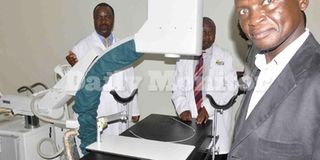Advanced cancer patients will not go to Nairobi - UCI

Dr Jackson Orem (R), the executive director UCI. File photo
Kampala. Patients with advanced cancer and in dire need of radiotherapy treatment will not be sent to Nairobi for medication, Dr Jackson Orem, the executive director Uganda Cancer Institute (UCI), has said.
Dr Orem said preference will be given to patients whose cancer is just starting because they have higher chances of surviving than those whose infection has widely spread in the body.
“Priority will be given to those patients who we know if offered radiotherapy treatment are going to get cured, those patients who radiotherapy will prolong their survival and other patients who have failed to control the cancer symptoms on all the other forms of treatment,” Dr Orema said.
Radiotherapy is a treatment involving the use of high-energy radiation with an aim to treat the cancer or relieve symptoms.
The cancer institute announcement comes after a new twist in the number of patients to be treated at Aga Khan Hospital in Nairobi, Kenya after the hospital offered to treat Ugandan cancer patients free of charge.
The offer came following the breakdown of the country’s only radiotherapy cancer machine more than a month ago.
Although officials from the Health ministry, led by state minister of Health, Dr Chris Baryomunsi, had earlier informed Parliament that the offer would cater for 400 patients, Dr Orem in an exclusive interview yesterday, told Saturday Monitor that the offer actually caters for 400 dozes and not 400 patients.
The rest of the patients, Dr Orem said, “will be put on other alternative forms of treatment like surgery and chemotherapy”.
But Dr Joseph Kigula Mugambe, a retired radiotherapy expert and former head of the radiotherapy unit at Mulago hospital, said a single patient on curative treatment requires over 25 dozes of radiotherapy.
“But the number of dozes can even go up to 30,” he noted adding that those patients on palliative treatment on average need about five dozes but not more than 10 depending on the prescription.
Dr Kigula also indicated that switching patients to the chemotherapy treatment may not be as effective as the radiotherapy kind of treatment.
“If the patient is on palliative treatment, radiotherapy helps to prolong their life, which chemotherapy may not do effectively,” Dr Kigula said.
This would therefore mean that if only patients with higher chances of survival are taken to Nairobi, only 16 patients on average will benefit from the offer.
Dr Orem was also noncommittal on whether government would cater for the transport, accommodation and meals of the eligible patients who are expected to start travelling next week.
In a related development, Dr Orem also revealed that Roko Construction Company Limited, who were also contracted to do the rehabilitation works ongoing at Mulago hospital, have been contracted to construct the bunkers to house the new radiotherapy cancer machine at UCI.
He, however, revealed that “only six bunkers would be constructed, and not seven, as it had earlier been communicated by the ministry.”
A team of experts from UCI, some surgeons, radiotherapists and oncologists that will select and vet the patients has also been instituted, he said.



